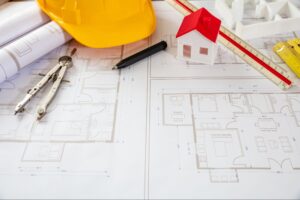Contractors for home remodeling contribute to safer homes and properties by ensuring construction meets structural integrity standards, building codes, and safety regulations. Their expertise minimizes risks related to faulty installations, weak foundations, and hazardous materials. Thus, many homeowners are very meticulous when hiring contractors to take care of their construction projects. By coordinating every aspect of the renovation, contractors prevent costly mistakes that could compromise safety. Their knowledge of modern building techniques and compliance requirements allows homeowners to achieve durable and well-structured improvements without unnecessary risks.
Responsibilities of Contractors for Home Remodeling
Home remodeling contractors oversee the renovation process, ensuring each stage meets quality, safety, and design expectations. Their responsibilities go beyond construction, covering project planning, material sourcing, and compliance with local regulations. Proper execution of these tasks results in a well-built and long-lasting home improvement.
Project Planning and Coordination
Detailed planning establishes a clear roadmap for the renovation process. Contractors assess the scope of work, set timelines, and coordinate with subcontractors to ensure smooth execution. Efficient scheduling prevents delays and keeps the project within budget.
Compliance With Building Codes and Permits
Adhesion to local building regulations is strictly enforced, ensuring the remodel meets safety standards. Contractors secure necessary permits, preventing legal complications and costly revisions. Inspections throughout the project confirm that all work aligns with official requirements.
Sourcing High-Quality Materials
Selecting durable and suitable materials enhances the longevity of renovations. Contractors leverage industry connections to find cost-effective options without compromising quality. Knowledge of trending designs and energy-efficient materials helps improve the outcome.
Supervision of Skilled Labor
Managing a team of workers ensures that each remodel aspect is executed correctly. Contractors oversee electricians, plumbers, and carpenters, ensuring their work meets professional standards. Addressing any issues immediately prevents rework and unnecessary expenses.
Budget Management and Cost Control
Accurate cost estimates help homeowners avoid overspending. Contractors track expenses, negotiate with suppliers, and find cost-saving solutions while maintaining quality. Preventing unnecessary purchases and reducing material waste keeps the budget under control.
Ensuring Structural Integrity and Safety
Proper construction techniques strengthen the home’s foundation, walls, and roofing. Contractors identify potential hazards and address them before they become serious problems. Safety measures for workers and homeowners reduce risks during and after the remodel.
Providing Timely Project Updates
Regular communication keeps homeowners informed about progress and potential challenges. Contractors offer updates on timelines, material deliveries, and any adjustments needed. Clear reporting prevents misunderstandings and ensures transparency throughout the project.
Key Benefits of Hiring Contractors for Home Remodeling
Professional contractors bring expertise, efficiency, and high-quality craftsmanship to home remodeling projects. Their ability to handle design, construction, and safety measures ensures long-lasting improvements that enhance aesthetics and security. Hiring experienced professionals prevents costly mistakes, delays, and structural risks, making home renovations a worthwhile investment.
Contractors for Home Remodeling Enhance Aesthetic Appeal
Expert contractors elevate a home’s visual appeal by incorporating modern design trends, high-quality materials, and seamless craftsmanship. Their ability to blend functionality with style enhances a property’s interior and exterior. Proper planning and execution produce a polished look that increases curb appeal and resale value.
Customized Design
Contractors assess the existing space and consult with homeowners to create a design plan. They draft blueprints that optimize layouts while ensuring structural integrity. Material samples are provided to help homeowners visualize the final look. Adjustments to lighting, flooring, and wall textures enhance aesthetics. Every design choice is finalized before construction begins to prevent changes that delay progress.
High-Quality Finishes
Contractors prepare surfaces properly before applying paint, tiles, or flooring materials. Precision tools cut, align, and install finishes without visible gaps. Protective coatings and sealants are applied to enhance durability and resistance to wear. Trim and moldings are measured and fitted to create clean, seamless transitions. Each completed section is inspected for flaws before moving to the next stage.
Efficient Space Utilization
Contractors evaluate the current layout and suggest modifications to improve functionality. Walls may be adjusted or removed to create a more open space. Built-in shelves, cabinets, and storage solutions are integrated to reduce clutter. Multi-purpose furniture or foldable elements are added to maximize small areas. Every change is planned to enhance both usability and visual appeal.
Enhanced Curb Appeal
Contractors assess exterior structures and recommend improvements that align with the home’s style. Siding and roofing materials are replaced or refinished to restore their appearance. Entryways and windows are upgraded to create a welcoming and modern look. Landscaping adjustments, including pathway design and lighting, improve outdoor aesthetics. Final exterior touches, such as painting and decorative elements, complete the transformation.
Contractors for Home Remodeling Ensure Security Measures
Safety improvements go beyond aesthetics, making a home more resilient to structural issues and external threats. Contractors address potential vulnerabilities by reinforcing key areas such as doors, windows, and foundations. Proper remodeling techniques provide homeowners with long-term security and peace of mind.
Reinforced Structural Integrity
Contractors inspect the home’s foundation, walls, and roof for weaknesses. They reinforce support beams and load-bearing structures to prevent collapses, seal cracks and gaps in walls to improve stability and insulation and use high-quality materials to strengthen flooring and ceilings. Safety inspections are conducted at each phase to ensure long-term durability.
Upgraded Windows and Doors
Contractors replace old doors with solid-core options that resist forced entry. Impact-resistant glass and reinforced window frames are installed for added security. High-quality locks and deadbolts are fitted to prevent break-ins. Weatherproof seals are applied to doors and windows to improve insulation. Every installation is tested to ensure proper function and durability.
Smart Home Security Integration
Contractors assess entry points and blind spots to determine the best placement for security systems. Smart locks and keyless entry systems are installed to enhance access control. Surveillance cameras and motion sensors are strategically positioned for maximum coverage. Alarm systems are integrated with mobile apps for remote monitoring. Each system is tested to ensure seamless operation and connectivity.
Fire and Electrical Safety Improvements
Contractors inspect wiring and electrical panels for outdated or faulty components. Fire-resistant insulation and smoke detectors are installed in key areas. Circuit breakers and surge protectors are upgraded to prevent electrical hazards. Proper ventilation systems are added to reduce fire risks in high-heat areas. Every safety feature is tested before final approval.
Contractors for Home Remodeling Follow Compliance Standards
Contractors ensure that remodeling projects meet local building codes, zoning laws, and safety regulations. Their expertise prevents legal issues that could lead to fines, delays, or reconstruction costs. Proper documentation and inspections guarantee that all work aligns with industry standards.
Proper Permit Acquisition
Contractors handle the paperwork required for remodeling permits. They submit applications, coordinate with local authorities, and ensure approvals before construction begins. Necessary inspections are scheduled at different stages of the project. Any revisions requested by inspectors are addressed immediately to keep the process on track. Homeowners avoid penalties and legal complications by working with professionals who understand regulatory requirements.
Code-Compliant Electrical and Plumbing Work
Licensed electricians and plumbers ensure that installations meet current safety codes. Wiring and outlets are positioned correctly to prevent electrical hazards. Pipes, drains, and fixtures are installed according to health and building standards. High-quality materials and proper sealing prevent leaks, short circuits, and structural damage. Every system is tested to confirm functionality before final approval.
Structural Integrity Verification
Contractors assess load-bearing walls, foundations, and roofing to ensure stability. Reinforcements are added where needed to prevent future damage or collapse. Materials used in construction comply with safety and durability standards. Inspections are conducted at each stage to identify potential structural weaknesses. Adjustments are made immediately to maintain compliance with local codes.
Insurance and Liability Coverage
Contractors carry insurance that protects homeowners from liability during construction. Workers’ compensation policies cover injuries on-site, preventing legal disputes. General liability insurance ensures coverage for accidental property damage. After completion, documentation of all warranties and safety certifications is provided. Homeowners gain peace of mind knowing that their project is legally and financially secure.
Contractors for Home Remodeling Focus on Sustainability
Eco-friendly remodeling reduces waste, conserves energy, and promotes long-term efficiency. Contractors integrate sustainable materials and energy-saving solutions into renovation projects. Thoughtful planning and execution create homes that support environmental responsibility.
Use of Sustainable Materials
Contractors source recycled, reclaimed, and eco-friendly building materials. They prioritize wood, stone, and metal alternatives with lower environmental impact. Non-toxic paints, sealants, and adhesives improve indoor air quality. Locally sourced materials reduce carbon emissions associated with transportation. Every material choice balances sustainability with durability and aesthetics.
Energy-Efficient Designs
Contractors install insulation, windows, and doors that reduce energy consumption. LED lighting systems and energy-saving appliances lower electricity usage. Solar panel integration provides renewable energy solutions for long-term savings. Smart home technology automates heating, cooling, and lighting to enhance efficiency. Every energy-efficient feature is tested to ensure maximum performance.
Waste Reduction Practices
Construction waste is minimized through precise material measurements and planning. Salvageable materials from demolitions are repurposed or recycled. Contractors use deconstruction methods instead of full demolition to preserve reusable elements. Efficient disposal strategies ensure hazardous waste is handled correctly. Homeowners benefit from a cleaner, more sustainable remodeling process.
Water Conservation Strategies
Low-flow faucets, showerheads, and toilets are installed to reduce water waste. Rainwater collection systems and greywater recycling options support sustainable usage. Smart irrigation systems optimize outdoor water consumption for landscaping. Leak-proof plumbing installations prevent unnecessary water loss. Every feature is designed to maintain efficiency without sacrificing functionality.
Improved Indoor Air Quality
Ventilation systems are upgraded to circulate fresh air and remove pollutants. Contractors select flooring and cabinetry that emit low levels of volatile organic compounds (VOCs). Air filtration systems are installed to reduce allergens and contaminants. Moisture-resistant materials prevent mold and mildew growth in humid areas. Every indoor air improvement contributes to a healthier living space.
Save Time and Energy With Contractors for Home Remodeling
Hiring professional contractors streamlines every aspect of a remodeling project, reducing stress and unnecessary delays. Their expertise in planning, execution, and problem-solving ensures that work progresses efficiently without compromising quality. Managing permits, sourcing materials, and coordinating skilled labor are handled seamlessly, allowing homeowners to focus on their daily routines. Avoiding DIY mistakes and time-consuming adjustments prevents costly setbacks and additional labor. Investing in experienced contractors guarantees a smooth renovation process that enhances the home’s value and overall living experience.
Get the latest remodeling insights from the Build All Construction Inc. blog and learn how professional contractors improve efficiency and quality.







